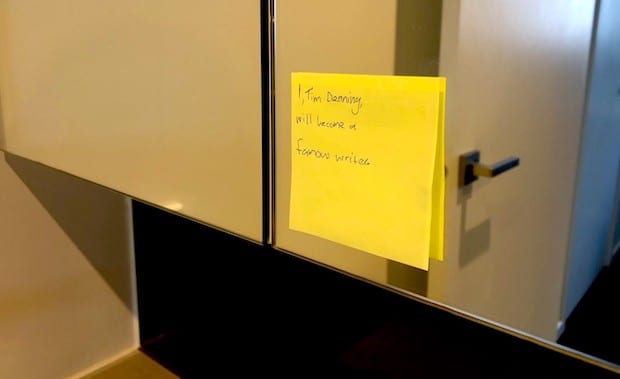Success Advice
Why You Need To Become An Expert At Failure

If there was one thing you want to become an expert in its failure. Failure is the small steps you need to take before you achieve the big step of success. A lot of us don’t understand what it really means to fail, and we are not taught its relationship to success.
It’s time to change what you think about failure and see it as a positive, guiding force in your life. It’s time to get serious about your goals and to raise your awareness of how your heroes really do succeed at all of their endeavors and make the whole thing look so damn easy.
Here are the 9 things you need to know about failure:
1. Fail Fast
A somewhat of a cliché in the startup world is to “fail fast.” Innovation is about trying lots of different ideas with the comfort of knowing that most are meant to fail. Failure is fine as long as you fail quickly. The longer failure drags on, the more your success and mindset are affected.
Get good at recognising failure and being proud of when things don’t give you the desired result. Nothing in your life is perfect, and failure shows us those beautiful imperfections we all have.
“It’s in our imperfections that our true beauty is revealed”
2. Move on quickly from failure
Getting stuck in failure and what has already transpired will put you into a depressed state of being. The trick with failure is to acknowledge it, and then quickly move onto the next idea or venture. Before you move on, extract the lessons, regroup your thoughts, and then be proud that you failed.
Failure takes a lot of guts, and only a mature adult can admit when something hasn’t worked out. The challenge we have in the corporate world is that failure is frowned upon. In the startup world, you’re a freakin hero when you fail, and it’s the cool, new hip way of doing things.
Practice the startup way of failing and you’ll be successful before you know it. Take the “Hollywood actor” corporate approach to failure and you’ll become about as relevant as the horse and cart from the early 1900’s. The choice is yours. Be bold, be smart, and leave your ego behind.
3. Reframe the failure
The word “failure” is a bit of a nasty word and some would say there is no such thing as failure. I like the word failure because it’s something that we can all relate to, and it takes us out of the whole positive thinking cult where we pretend that nothing ever goes wrong.
Stuff goes wrong all the time, and it’s supposed to. The key to failure is to align it in your mind with the word lesson. Lessons are a cheap form of education, and they stop you from blowing more time, energy, and money on concepts that don’t work.
Entrepreneurs who get good at failure typically save thousands, if not millions of dollars in product development.
4. The best products are wrapped in failure
I spent some time in an innovation lab this year, and the whole experience shaped the idea of failure for me. When you see what goes into making a world-class product, you understand just how important failure is.
All good products that become icons of our time have a tremendous amount of failure embedded in them. What makes a product wrapped in failure do so well is when the customer is brought in for the whole failure journey.
Success in business is a fine line between customer lead design, and knowing how to see the world better than it is with a lens that no one is currently using. Consumers didn’t know they wanted a tablet until some bright spark came up with one.
The finished product though had hours and hours of failed attempts at the core of its design. Bottom line; get good at dancing with failure in all aspects of your life and business.
5. Block out the opinions about your failure
Everyone can tell you how they think you should do something, but only you and your team can see the end vision. Conversely, everyone has an opinion on why you failed. Don’t get wiped out by a tidal wave of what people say about your failures.
No one is as close to your failure as you are so they can’t know all the finer details. Getting lost in opinions causes you to get trapped in a reality that won’t move you forward. What one person sees’s as the truth is not always the absolute truth.
Opinions of your failures can derail your confidence and make you experience feelings that will sabotage your success.
“You’re in the driver’s seat of your life so don’t let failure force you to hit the eject button too soon”
6. Understand that failure and success are joined at the hip
I get asked all the time by Addicted2Success fans how to have more success. The big secret that nobody’s talking about is to understand that failure and success are joined at the hip. If you want more success, then you have to add in more failure.
Success and failure are part of the same recipe called “Your Dream.” You are not just going to trip over success in the street and suddenly make it. By increasing your failure rate, you allow yourself to see more success.
While listening to the famous skateboarder Tony Hawk recently, I got the idea of failure nailed in my mind. Tony said that when he is trying to learn a complicated trick that’s never been done by any human before, he fails 99 times out of 100.
When he did the nine hundred degree spin for the first time, it wasn’t because he had more skill. There were plenty of other skateboarders trying to do the same trick at exactly the same time. What made Tony Hawk successful was that he was prepared to fail more than them and deal with the fear that comes from potentially enduring a major injury as a result of his failure.
Even the sporting greats like Tony Hawk are not these gods that we perceive them to be. Their secret formula is quadrupling their rate of failure. Are you bold enough to do the same and experience the success that comes along with it?
7. It’s better to fail than never try
Society is full of couch commentators who scream at the TV about how things should be done. Rather than be a passive participant in life, try going out there and failing. It’s better to take action and fail than it is to never try and miss your full potential.
Failure shows us that you are trying, and you haven’t found the right path yet. Most of us don’t know the right path to success yet, even though we fool people into thinking we do with our perfect social media photos.
Wealth starts in the mind and then it manifests itself in the material world. Start trying and forget about your rate of failure. You’ve got this!
“I’d rather you failed a million times than just sat on the couch and did nothing hoping that the lottery will make you rich” – Tim Denning
8. Failure get’s easier
The fantastic thing about failure is that it get’s easier the more you do it. When we do something over and over, it becomes comfortable. The best action you can take in your life is to commit to getting comfortable with failure which is at the root of your eventual success.
9. Failing does not equal quitting
Quitting and failing are two different things. Quitters exit from their dream altogether and blame outside circumstances. They also take no lessons or value away from the experience and choose to live in a state of madness about what has transpired.
Failing is very different and implies that you learned something from the experience and insinuates that you are going to have a second try. Quitting is to cut off from all possibilities and choose not to give your passion a second chance.
Learn to fail and stay away from quitting.
***A story of failure***
I have hundreds of stories of failure but one that stands out clearly to me, from being a blogger, came to me recently. Early on, when I began writing on Addicted2Success over two years ago, I had an article that went semi-viral.
I started to think I was Superman, and I wanted to follow up the blog post with another popular story. At this stage, my purpose, dream, and vision were still not quite clear and I was admittedly a little naive in my thinking at the time.
While thinking about what I could write about next, I remembered the horrible story I went through when I was sixteen years old and was nearly murdered while being out late one night. The story, I thought, had many lessons to be learned and I was sure that people would connect with it.
After going to all sorts of trouble to make the post perfect, and even going to great troubles to get the right photo (and buying a knife for the photo), I published the post, and it didn’t resonate. At the time, I thought that I had failed, and I wasn’t sure if I was cut out to do this whole blogging thing.
Thankfully, I got some sense knocked into me by a few people, and I moved on from this failure. Had it not been for this blog post, I would have continued to live in a false world with an over inflated ego.
Failure brings us back to reality, and it allows us to try again with a new perspective on things. By having the blog post do poorly, I learned more about what I should be writing and changed the direction of my success.
Ultimately, I wouldn’t be here today if it wasn’t for many of these failed blog posts that produced very little result.
What has failure taught you and how have you failed? Let me know on my website timdenning.net or my Facebook.
Did You Know
How Skilled Migrants Are Building Successful Careers After Moving Countries
Behind every successful skilled migrant career is a mix of resilience, strategy, and navigating systems built for locals.

Moving to a new country for work is exciting, but it can also be unnerving. Skilled migrants leave behind familiar systems, networks, and support to pursue better job opportunities and a better future for their families. (more…)
Life
10 Research-Backed Steps to Create Real Change This New Year
This New Year could finally be the one where you break old patterns and create real, lasting change.

Every New Year, we make plans and set goals, but often repeat old patterns. (more…)
Change Your Mindset
The Silent Skill That Makes People Respect You Instantly
What truly earns respect and why most people go about it the wrong way

Everybody craves respect but not everyone earns it. Some people believe that a title, years of experience, or a position of authority automatically entitles them to respect. (more…)
Entrepreneurs
The Essential Skills Every Entrepreneur Needs In 2026
Success in the digital age isn’t about luck. It’s about mastering the skills that separate dreamers from doers.

When I was 22 years old, I started my first side hustle as a ghostwriter. (more…)
-

 Change Your Mindset4 weeks ago
Change Your Mindset4 weeks agoHow to Turn Your Mind Into Your Greatest Asset (Instead of Your Enemy)
-

 Change Your Mindset4 weeks ago
Change Your Mindset4 weeks agoThe Silent Skill That Makes People Respect You Instantly
-

 Life3 weeks ago
Life3 weeks ago10 Research-Backed Steps to Create Real Change This New Year
-

 Did You Know2 weeks ago
Did You Know2 weeks agoHow Skilled Migrants Are Building Successful Careers After Moving Countries
-

 Tech3 weeks ago
Tech3 weeks agoWhat’s in a Name? How to Get Your Domain Right



















5 Comments